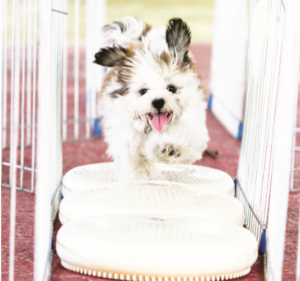Training your puppy should begin the moment you welcome it into your home. A common misconception is that puppies should be slightly older―around six months or so―for training to ‘take’, but Doc Marose assures us that this mindset stems from the old school method training, where disobedience is equated with punishment; employing harsh methods would naturally require older puppies with the physical capacity and stamina to withstand punishment.

Asserting dominance over your dog is also ill-advised: this kind of behavior is a possible stress trigger and may cause your pets to become wary and mistrustful in your interactions―or worse, make them respond to your commands with aggressive behavior.
These days, obedience training is rewards-based. Enforcing good behavior with special treats helps dogs associate routines with fun, making even the youngest of puppies happy and willing participants in training.
That said, it is possible to teach an old dog new tricks. But understand that it might take longer for older dogs to catch on, especially those without any sort of learning foundation. An older dog, such as those adopted from animal shelters, comes with baggage: bad habits inadvertently encouraged or rewarded, or in extreme cases, trauma and abuse. Take a little extra care and effort in rewarding good behavior, and your older dog will eventually integrate properly into your household. Remember to consult with or engage the services of a canine behavior specialist should training prove more difficult than anticipated.
Dog training is not just for dogs: it is also for their owners. Caring for pets is a lifelong responsibility, and if dogs are expected to adjust to their owners’ house rules, pet owners should be able to commit to modifying their lifestyle to ensure their pets’ well-being. Sending a dog to obedience school does not absolve an owner from training responsibilities; in fact, personally handling your dog’s manners training is encouraged since this allows you to form a bond with your puppy.
What a training class offers is guided teaching in a structured learning environment. It also provides socialization opportunities for pets and their owners―not only do you become friends with your puppy, you also make friends with pet owners and pets in the community.
This story appeared in Animal Scene’s January 2015 issue.






